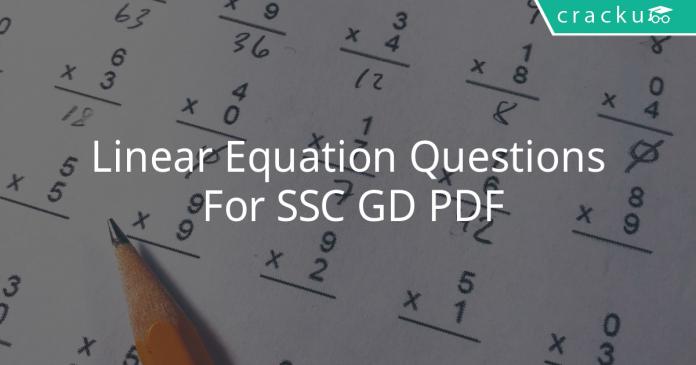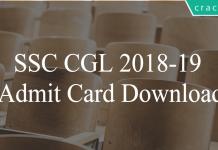Linear Equation Questions For SSC GD PDF
LINEAR EQUATION QUESTIONS FOR SSC GD PDF
GET 20 SSC GD MOCK FOR JUST RS.117
Question 1: A linear equation has 4 variables. What is the least number of equations do you need to figure out the values of all 4 variables?
a) 2
b) 3
c) 4
d) 5
e) 8
Question 2: Solve the following system of linear equations and determine the value of x + y + z.
3x + 2y + z = 25
5x + 3y + z = 40
x + 4y + 2z = 10
a) 20
b) 10
c) 5
d) 15
e) Cannot be determined
Question 3: At least how many equations are required to determine the values of all the variables in a linear equation with 3 variables
a) 1
b) 2
c) 3
d) 4
e) 5
Question 4: How many solutions do the following set of equations have?
$2x+3y=9$ and $4x+6y=18$
a) Unique solution
b) No solution
c) Infinite solutions
d) Cannot be determined
e) None of these
Question 5: How many solutions do the following set of equations have?
$2x+3y=9$ and $4x+6y=27$
a) Unique solution
b) No solution
c) Infinite solutions
d) Cannot be determined
e) None of these
Question 6: How many solutions do the following set of equations have?
$2x+3y=9$ and $3x+2y=9$
a) Unique solution
b) No solution
c) Infinite solutions
d) Cannot be determined
e) None of these
Question 7: The number obtained by interchanging the digits of a two-digit number is less than the original number by 63 If the sum of the digits of the number is 11, what is the original number ?
a) 29
b) 92
c) 74
d) Cannot be determined
e) None of these
Question 8: Two linear equations 3x+5y=20, 24x+40y=K will have no solution for x and y when k = ?
a) 160
b) 8
c) 40
d) both b and c
Question 9: x+3y=12 and 5x+15y=3k are two linear equations then for what value of k will the equations have infinite solutions ?
a) 0
b) 4
c) 20
d) 12
Question 10: How many solutions does a pair of linear equations will have, if the equations are
7x+4y-16=0 and 14x+6y-32=0?
a) 0
b) 1
c) 2
d) Infinite
Answers & Solutions:
1) Answer (C)
To uniquely determine each of the given variable, we need the number of equations to be at least equal to the number of variables. Hence for 4 variables, we need at least 4 equations to uniquely determine the value of each variable.
2) Answer (D)
3x + 2y + z = 25 (I)
5x + 3y + z = 40 (II)
x + 4y + 2z = 10 (III)
II – I gives
2x + y = 15 (IV)
2*(I) – III gives
5x = 40
=> x = 8
Putting value of x in equation IV gives
y = -1
Putting value of x and y in I gives z = 3
So required sum is 8+3-1 = 10
3) Answer (C)
In a linear equation with 3 variables, we will have 3 unknowns and so we will need at least 3 equations to uniquely determine the value of all three variables.
4) Answer (C)
The two linear equations, $ a_{1}x+b_{1}y=c1$ and $ a_{2}x+b_{2}y=c2$ :
Have a unique solution if $\frac{a_{1}}{a_{2}}\neq\frac{b_{1}}{b_{2}}$
Have no solution if $\frac{a_{1}}{a_{2}}=\frac{b_{1}}{b_{2}}\neq\frac{c_{1}}{c_{2}}$
Have infinite solutions if $\frac{a_{1}}{a_{2}}=\frac{b_{1}}{b_{2}}=\frac{c_{1}}{c_{2}}$
In the given equations $\frac{2}{4}=\frac{3}{6}=\frac{9}{18}$. So the equations have infinite solutions.
5) Answer (B)
The two linear equations, $ a_{1}x+b_{1}y=c1$ and $ a_{2}x+b_{2}y=c2$ :
Have a unique solution if $\frac{a_{1}}{a_{2}}\neq\frac{b_{1}}{b_{2}}$
Have no solution if $\frac{a_{1}}{a_{2}}=\frac{b_{1}}{b_{2}}\neq\frac{c_{1}}{c_{2}}$
Have infinite solutions if $\frac{a_{1}}{a_{2}}=\frac{b_{1}}{b_{2}}=\frac{c_{1}}{c_{2}}$
In the given equations $\frac{2}{4}=\frac{3}{6}\neq\frac{9}{27}$. So the equations have no solution.
FREE SSC PRACTICE SET DAILY TEST
6) Answer (A)
The two linear equations, $ a_{1}x+b_{1}y=c1$ and $ a_{2}x+b_{2}y=c2$ :
Have a unique solution if $\frac{a_{1}}{a_{2}}\neq\frac{b_{1}}{b_{2}}$
Have no solution if $\frac{a_{1}}{a_{2}}=\frac{b_{1}}{b_{2}}\neq\frac{c_{1}}{c_{2}}$
Have infinite solutions if $\frac{a_{1}}{a_{2}}=\frac{b_{1}}{b_{2}}=\frac{c_{1}}{c_{2}}$
In the given equations $\frac{2}{3}\neq\frac{3}{2}$. So the equations have a unique solution.
7) Answer (B)
Let units place digit be x and tens place digit be y.
Original number = 10y + x
Number obtained on interchanging the digits = 10x +y
By given conditond,
x+y = 11
10x +y = 10y +x – 63
9y – 9x = 63
y – x = 7
Solving the linear equations we get,
y=9 and x=2
Original number is 92 i.e option B.
8) Answer (D)
For the given two equations 3x+5y=20 and 24x+40y=k
8(3x+5y)=k
3x+5y=($\frac{k}{8}$)
They have infinite solutions if k=160 and for all other values of k it will have no solution.
9) Answer (C)
x+3y=12$\rightarrow$ 1
5(x+3y)=3k
x+3y=$\frac{3k}{5}\rightarrow$ 2
These both equations represent a single equation and have infinite solutions when $\frac{3k}{5}$=12.
$\therefore$ k=20.
10) Answer (B)
Equations : 7x+4y-16=0 and 14x+6y-32=0
Comparing the ratio of coefficients of both equations,
=> $\frac{7}{14}\neq\frac{4}{6}$
Thus, there is only 1 solution.
=> Ans – (B)





